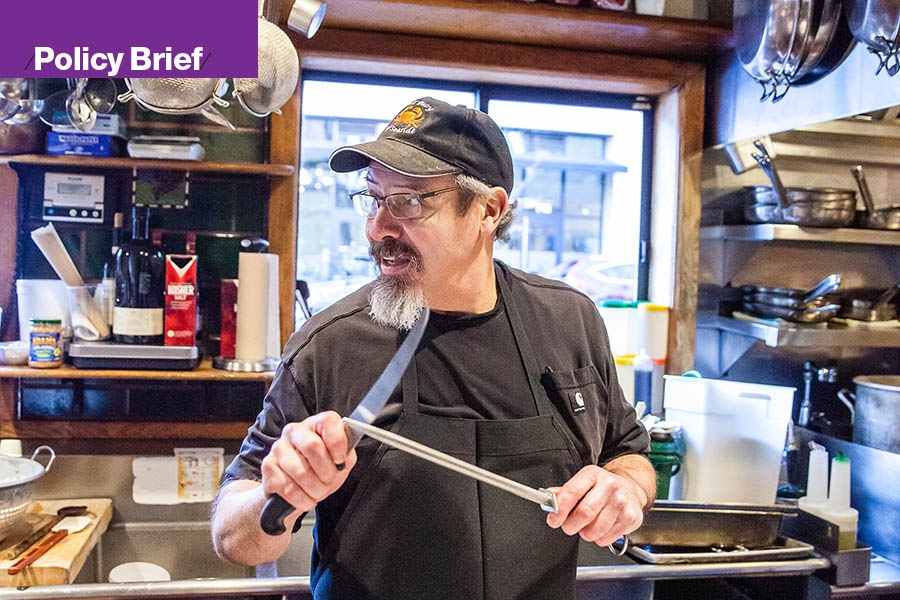Erika Polmar, the executive director of the Independent Restaurant Coalition, writes about why the Restaurant Revitalization Fund is critical
For nearly 20 years, Plate & Pitchfork has invited eaters to dine on farms that provide Oregon home cooks and chefs with beautiful produce. It has been our hope that when diners meet the people and places that grow and raise their food, they will come to understand the immense connection our purchasing habits have to the health of our bodies, our communities and our environment.
Over five beautiful courses prepared by local chefs in the middle of the field, diners learn about the partnership between farmer and chef and the journey food takes from the field to their table. Plate & Pitchfork diners have learned about the challenges Oregon agriculture has faced for decades, as the expansion of cities, suburbs and exurbs encroaches on land best suited for growing our food.
According to the USDA 2017 Census of Agriculture, 340,000 acres fell out of agricultural production in Oregon from 2012 to 2017. Since 1997 the state has lost nearly 10% of its farmland. On top of that, extreme heat, drought and forest fires have become extreme threats to crops and land each summer. Now, through the course of the pandemic, we’ve seen firsthand a new obstacle. Every link in the supply chain has been impacted by the pandemic, making products from flour to toilet paper hard for consumers to find.
When our neighborhood restaurants had to close their doors, Oregon farmers, ranchers, fishermen and wineries — who together contribute more than $5 billion to our state’s economy — suddenly lost some of their best customers.
Like restaurants, farmers work on incredibly thin margins, and the investment of time and resources they make in each product they provide is significant. Your favorite burger or steak has been in the making for 30 months.
Over the last 18 months, restaurants in Oregon have closed, opened, closed again, opened again. Too many have closed for good. The one thing restaurants of all stripes haven’t done is return to pre-pandemic sales volumes. They’re saddled with 18 months of debt, increased supply costs, hesitant consumers and the ever-looming threat of the delta variant. They’re hanging on by a thread. And they’re not alone. Nationwide there are nearly 200,000 restaurants on the brink of permanent closure, and if we let them close, it will have large-scale and irreparable consequences for supply chains that will ripple through the entire economy, touch every single American and eliminate jobs. “Supply chain” is an abstract term, but here it means Ken, Erica and Lucy from Walter Scott Wines, who make beautiful wines in the Eola-Amity Hills and depend on sales to restaurants for revenue and an opportunity to have diners experience their wines.
It means Cory Carman from Carman Ranch, who raises beef on her century-old family ranch in Wallowa that appears in Burgerville’s Number 6 burger and as a centerpiece of the Higgins lunch and dinner menu.
Behind each and every link in our supply chain, there are familiar faces and families whose products make menus memorable and whose farms make a tremendous impact on our community.
There is a solution to this pending calamity. Earlier this year, the Restaurant Revitalization Fund (RRF) — a $28.6 billion federal grant program designed by independent neighborhood restaurant and bar owners in consultation with local Congressman Earl Blumenauer — was signed into law as part of the American Rescue Plan.
The program was incredibly popular and the demand for it far exceeded the funds Congress allocated. Because the program was underfunded by over $43 billion, 177,000 restaurants and bars that applied for funding were left out.
As eaters we have more power than we often realize. With every purchase, we are making our choices known, casting a vote. And at this moment, Oregon’s restaurants and producers need us to use that power on their behalf. In addition to purchasing from both restaurants and local farms, we must raise our voice in support of them and urge our elected officials to replenish the Restaurant Revitalization Fund.
Help us keep the connection between farm and table strong in Oregon and beyond. Call Congress today.
Erika Polmar is the executive director of the Independent Restaurant Coalition and the founder of Plate & Pitchfork.
To subscribe to Oregon Business, click here.






